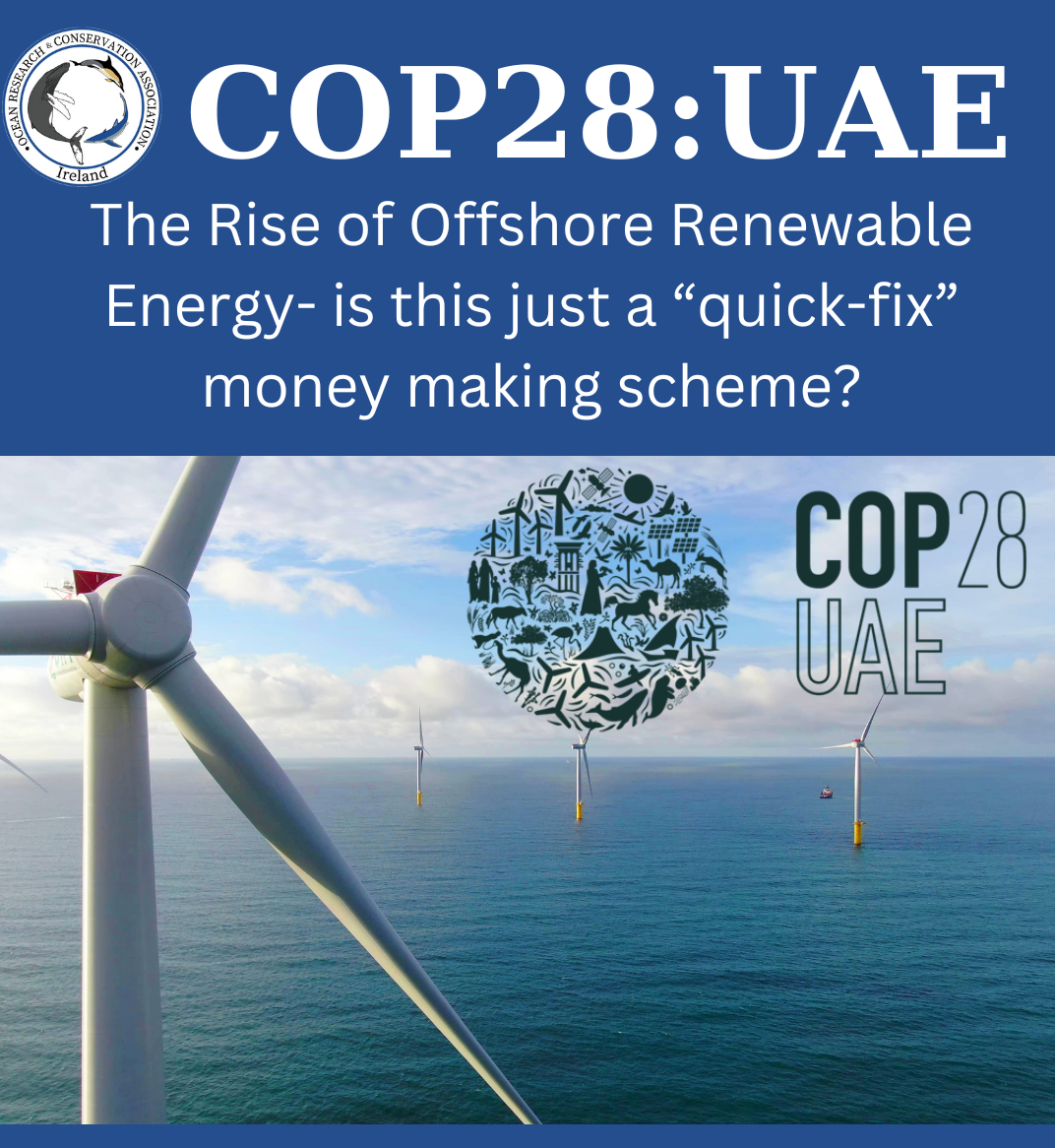Are Offshore Renewable Energy (ORE) developments just a “quick-fix” money-making scheme by greenwashing energy companies?
Are Offshore Renewable Energy (ORE) developments just a “quick-fix” money-making scheme by greenwashing energy companies?
ORCA SciComm Team | 1st December 2023
The surge in Offshore Renewable Energy (ORE) developments has been met with both enthusiasm and skepticism. As we witness a transition from traditional energy sources to renewable options like wind, tidal, and wave energy, critical questions arise. Are these efforts genuine strides toward sustainability, or are they merely profitable ventures cloaked in the guise of environmental responsibility?

The Rise of Offshore Renewable Energy (ORE):
Offshore wind farms, tidal, and wave energy projects are increasingly dotting our oceans. Their appeal lies in the untapped potential of the sea – higher wind speeds and the powerful, predictable nature of tidal movements. This shift is not just a trend; it's a response to the urgent need for cleaner energy sources.
ORE Overview:
Wind Energy: The most developed form of ORE. Offshore wind farms harness wind power over the ocean, where wind speeds are typically higher and more consistent than on land.
Tidal and Wave Energy: Less developed but promising, these technologies use the movement of water to generate electricity.
Greenwashing: A Legitimate Concern or a Misguided Critique?
The term 'greenwashing' has become synonymous with efforts by traditional oil and gas companies to appear eco-friendly without making substantial changes to their operations. With these companies now investing heavily in ORE, it's reasonable to question their motives. Are they diversifying their energy portfolio out of a genuine concern for the planet, or are they seeking to improve their public image while continuing their usual practices?
Some skeptics argue that oil and gas companies are investing in ORE mainly for public relations, without a real commitment to abandoning fossil fuels. However, others see this as a positive shift, indicating a serious recognition by these companies of the need to transition to renewable energy sources.
Environmental Impact on Marine Wildlife:
Any intervention in natural habitats comes with consequences. In the case of ORE, there are concerns about noise pollution during the construction phase of these massive structures, potential hazards to marine life, and the alteration of underwater ecosystems. Mitigating these impacts requires careful planning, technological innovation, and a commitment to environmental stewardship.
Potential Negative Impacts: Noise pollution during construction, risk of collision for marine animals, and changes in habitat due to the presence of large structures.
Mitigation Measures: Proper site selection, use of technology to minimize noise, and ongoing monitoring of wildlife can reduce these impacts.
Economic Perspectives:
While the economic aspect of ORE cannot be ignored – with high initial costs but promising long-term returns – it's essential to recognize that transitioning to renewable energy is not just a business decision. It's a crucial step towards a sustainable future. As fossil fuel extraction becomes more challenging and costly, renewable energy sources like ORE offer a viable alternative.
Initial costs for offshore renewable projects are high, but technological advancements and economies of scale are reducing these costs.
As traditional oil and gas resources become more challenging and expensive to extract, ORE becomes more economically competitive.
Is ORE a Quick Fix or a Long-term Solution?
To dismiss ORE as a mere profit-driven endeavor is to overlook its potential as a sustainable energy solution. Yes, the industry is still evolving, and its long-term success hinges on technological advancements and the integration of these energies into our existing systems. But, the shift towards ORE represents a meaningful step in the right direction.
While ORE is not a panacea, it has the potential to be a significant and long-term contributor to global energy needs, particularly in regions with favorable wind and tidal conditions.
The sustainability of ORE depends on continued technological advancements, reducing environmental impacts, and integrating it with other forms of renewable energy and storage solutions.
While ORCA Ireland’s concerns about greenwashing and environmental impacts are valid, offshore renewable energy has the potential to be more than just a "quick fix." With careful planning, technological innovation, and a genuine commitment to transitioning away from fossil fuels, ORE can be a sustainable, long-term solution to our energy needs. The key is balancing the development of these technologies with responsible stewardship of marine ecosystems.
Offshore Renewable Energy stands at the crossroads of environmental innovation and economic opportunity. While it’s prudent to scrutinize the motives behind these developments, especially from traditional energy giants, we must also acknowledge the broader benefits of this transition. ORE offers a path to a cleaner, more sustainable energy future, but its success depends on our collective commitment to not just economic gains, but to the health of our planet. As we sail into this new era of energy production, let’s ensure that our compass is set towards true sustainability, not just short-term profits.
SHARE THIS ARTICLE













